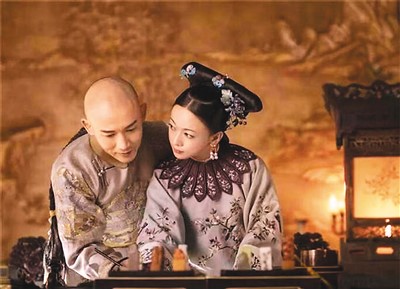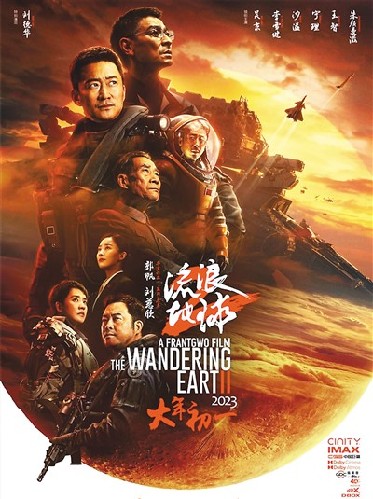Author: Zhang Pan
Mainland film and television dramas such as “Hurricane”, “Three-Body Problem” and “The Wandering Earth 2” have recently attracted widespread attention in Taiwan. The audience on the island is full of praise for the plot and performance. During the Spring Festival this year, a TV station in Taiwan also broadcast the mainland costume drama “The Legend of Zhen Huan” on the Internet 24 hours a day. It was broadcast for 5 rounds, with a total of 4.73 million people watching, and the highest number of people online at the same time was 32,000.
Mainland movie “The Wandering Earth 2” promotional poster.

Stills of the mainland TV series “Story of Yanxi Palace”.The pictures are all from the Internet
Jiao Xiongping, a well-known Taiwanese film scholar and producer, told reporters that mainland film and television dramas are well-produced and very attractive to audiences. Over the years, mainland film and television dramas have made great leaps in technology, thinking, and aesthetics. The two sides of the strait can work together in many ways to give China’s film and television industry a new look.
Mainland film and television dramas become popular in Treasure Island
Since the 1990s, the mainland TV series “Water Margin”, “Iron Teeth and Bronze Teeth Ji Xiaolan”, “Prime Minister Liu Luoguo” have all achieved good ratings in Taiwan, and “Yongzheng Dynasty”, “The Mansion Gate” and “Kangxi Dynasty” have even attracted Taiwanese audiences. Hungry. In 2012, “The Legend of Zhen Huan” caused a sensation in Taiwan, and Lu dramas became popular on the island.
On social networking sites commonly used by Taiwanese people, the number of fans in multiple Lu drama communities is as high as 200,000 to 300,000. From plot characters to costumes and makeup, food culture, filming locations, etc., they are all hot topics that Taiwanese audiences love to talk about. For example, “Hurricane” has become a big hit recently, and some Taiwanese audiences who follow the drama expressed their desire to read “The Art of War” recommended by the characters in the drama, and also want to go to Jiangmen, Guangdong, where the scene was filmed, to taste delicious rice rolls. The topical effect of Lu dramas swept Taiwan, and the island’s media rushed to report. For example, when “Story of Yanxi Palace” was on the air on the island, many Taiwanese TV stations were commenting on the show during popular hours, and shopping malls, restaurants, and travel agencies also launched supporting services around the hot spots in the show.
Lu opera is so attractive that political figures on the island are also fascinated by it. Lien Chan, the former chairman of the Chinese Kuomintang, is a fan of “Water Margin” and has talked about his experience watching the drama on many occasions. People First Party Chairman James Soong once expressed his love for watching “Yongzheng Dynasty”. Some green camp politicians will blurt out lines from Lu dramas, and some green camp public opinion representatives will not forget to secretly follow the drama even in the island’s deliberations.
Historical dramas are popular
Looking back at the history of Lu dramas becoming popular in Taiwan, it is not difficult to find that most of the mainland film and television dramas that were popular at first were historical themes, but now they are more diverse. Themes such as realism and science fiction are also popular among Taiwanese audiences, but historical themes are still the most popular. Jiao Xiongping believes that this shows that Taiwanese people are very interested in Chinese history and culture. In 2020, the DPP authorities blocked mainland audio-visual platforms such as iQiyi and Tencent Video in an attempt to prevent Taiwanese people from enjoying mainland film and television dramas. Facts have proved that the Taiwanese people will not buy it.
Taiwan’s “Wang Pao” editorial pointed out that although the DPP authorities have continued to downplay Chinese history by modifying the curriculum and other means, the young audience in Taiwan has obviously not been greatly affected and still favors these TV dramas with Chinese history as the background. Taiwanese people have always liked Chinese historical dramas. The popular Taiwanese dramas of the 1980s and 1990s, “A Generation of Empresses”, “A Generation of Empresses” and “Bao Qingtian”, including the cross-strait co-produced “Joking about Qianlong”, all originated in China. The historical events and anecdotes of different historical dynasties are also the reason why the series is full of charm and exciting. It wasn’t until the general environment of Taiwan’s film and television drama production changed that idol dramas and low-cost fashion dramas became the mainstream of the island’s self-produced dramas.
The editorial pointed out that although Taiwan’s younger generation has long been influenced by the “removal of China” textbooks and the instigation of “hatred against China” by politicians on the island, they still resonate with the mainland’s large investment, large productions, and high-quality historical dramas. It can be seen that even if politicians on the island try to split the two sides of the strait, young people in Taiwan will eventually perceive the connection between the cultures of the two sides of the strait through exchanges of life experience, drama and art. This stems from the deep cultural connection and historical perception, and will never be easily swayed by the deliberate manipulation of politicians on the island.
Taiwan film and television drama creativity seeks change
Lu dramas have long flourished in Taiwan, and Taiwanese film and television dramas have also brought many unforgettable memories to mainland audiences. The series “Bao Qingtian” and other folk tales from the Song Dynasty were popular on both sides of the Taiwan Strait. Many TV series adapted from Qiong Yao’s novels went to the mainland to shoot scenes, invited mainland actors to star, and even entered the era of co-productions. . In 2001, “Meteor Garden” created a wave of idol dramas in Taiwan. Over the past 10 years, Taiwanese idol dramas have been released one after another, becoming a youthful memory of a generation in mainland China. In recent years, Taiwanese film and television dramas such as “Want to See You”, “The Growth of a Vulgar Girl”, and “The Distance Between Us and Evil” have also gained many mainland fans.
However, limited by issues such as the domestic market, creative talents, and production costs, the development of Taiwan’s film and television dramas once encountered bottlenecks. After the Lu drama “Langya Bang” became popular, Taiwan’s film and television practitioners admired the production level of Lu dramas, and worried about the film and television environment on the island: Taiwan has not filmed a completely self-made costume drama for a long time, and even combed costume hair. No one can be found. In recent years, the mainland has been successful in running costume dramas, with talents, scripts, and filming scenes all in one place. It will be difficult for Taiwan to compete with them in the future. Some people even questioned, will Taiwan still make costume dramas?
A senior producer in Taiwan believes that many people doubt that Taiwan will not make costume dramas, but in fact this should be looked at separately. The production level has to be handed over to the mainland, because Taiwanese can’t write such wonderful dialogues, and can’t find suitable studios for shooting, but at the creative level, Taiwan still has talents. Compared with mainland China’s current trend of developing TV dramas, online dramas, mobile games, movies, comics, variety shows, and even peripheral products from IP, Taiwan’s next step may be to change from the source.
Exchanges and cooperation look forward to new breakthroughs
Cross-strait film and television exchanges are an important channel to enhance the understanding of people on both sides of the strait and jointly promote the excellent traditional Chinese culture. Over the years, the two sides of the strait have not only introduced film and television dramas to each other, but also carried out extensive co-productions. Every year, thousands of Taiwanese entertainers participate in mainland radio and television programs and film and television productions. After continuous attempts, many high-quality co-productions have appeared in recent years. As the mainland continues to introduce favorable policies to promote cross-strait film and television cooperation, Taiwanese film and television practitioners have more space and better conditions for development in the mainland.
Jiao Xiongping said, I often go to the mainland, and I often visit the production crews. In every production crew, I found Taiwanese staff scattered in various departments such as art, photography, and sofa. The mainland’s capital and market can provide Taiwan’s film and television practitioners with a lot of room to play, and Taiwan’s long-term accumulated experience in film and television creation can also provide a very good supplement for the mainland.
Some Taiwanese media commented that in 2018, the mainland issued “Several Measures on Promoting Cross-Strait Economic and Cultural Exchanges and Cooperation”, canceling the restrictions on the number of Taiwanese practitioners participating in the production of mainland film and television dramas, canceling the restrictions on the number of imported Taiwanese film and television dramas, and relaxing the restrictions on cross-strait film and television production. These policies have far-reaching significance for deepening cross-strait film and television exchanges and cooperation.
At present, the DPP authorities are still setting up obstacles in cross-strait film and television cooperation. In addition to banning mainland video platforms, the DPP authorities have not loosened the quota system for mainland movies so far. For mainland movies to be released in Taiwan, they first need to draw lots to obtain quotas. This means that good movies in mainland China, whether or not Taiwanese audiences can see them all depends on luck. In addition, the DPP authorities also have restrictions on mainland film and television practitioners coming to work and develop in Taiwan. Taiwan’s film and television industry and Taiwan media have repeatedly called for the DPP authorities to relax the corresponding restrictions in time, so that cross-strait film and television cooperation can truly usher in “spring blossoms.” (Zhang Pan)
[
责编:崔益明 ]
